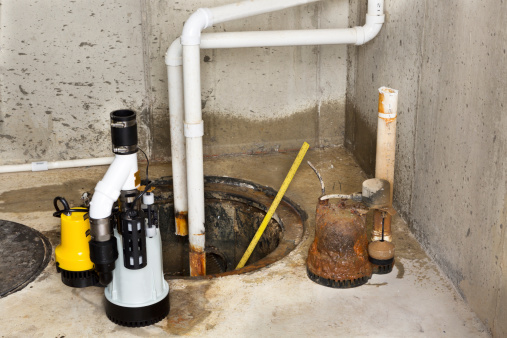Will a Sump Pump Really Save My Basement?

What’s in a Sump Pump?
Sump pumps have been around for awhile now – since the 1940s to be exact – but the technology has come a long way since they first arrived on the home improvement scene. Nowadays, depending on what level of protection and the kind of application for the pump you’re looking for, you’ve got a variety of options to choose from. A typical solution for residential purposes usually involves a small pit being dug at the lowest point of the basement. The pit is lined to protect it from the natural debris and silt of the surrounding area, and a submersible style sump pump is installed with output piping that pumps water away from the home when the pump is activated. If there is water below the home, a properly installed sump pump will evacuate it before it rises and causes trouble.
Dangers of Basement Water
Water in your basement can cause serious structural problems if it’s left alone for an extended amount of time, but even well before that’s the issue, there are plenty of unpleasant outcomes you could experience. Your possessions in the basement may be ruined or damaged, flooring or carpets soaked, and there’s the potential for damage to your walls and framing, rotting wood, drywall, etc. There can also be health and safety concerns from mold and mildew. While there may be a number of reasons that water wound up in your basement, in most cases, having a working sump pump installed could have mitigated much of the damage.
Keeping Your Sump Pump in Working Order
The question of whether or not your sump pump needs annual maintenance is a tricky one. Technically, if it’s working, you could assume all is well and there is no need to have it checked professionally. Then again, if there hasn’t been any groundwater recently, you might not know there’s a problem until you’re facing unwanted water in your home.
Every 3-4 months, you should dump a bucket of water into the sump pit to ensure the pump turns on and the float is working properly. When you conduct this test you can also visually confirm that the power cord is safely and fully connected. Many people prefer to have a professional check their sump pump system. Save Home Heat offers annual maintenance plans that cover having your sump pump checked at least once a year alongside all the other aspects of your home’s heating/cooling, plumbing, and electric systems.
What Else Might I Need?
If your heat goes out or your car won’t start, it’s no fun, but typically not a catastrophe. But if your sump pump doesn’t come on as expected, you likely won’t know until you step into the water, or maybe your nose alerts you. While nothing is foolproof, there are backup systems and alarm mechanisms available on some model pumps that reduce the risk of a soggy surprise.
Heading into that Rocky Mountain spring means we’re heading into one of your basement’s most vulnerable parts of the year. Having a properly sized sump pump for your home, with the features that make the most sense for your safety and protection, is an important step toward keeping you safe, comfortable, and dry. If you’re in the Denver/Boulder area and looking to install or replace a pump, or upgrade your existing sump pump system, we would love the opportunity to help.




